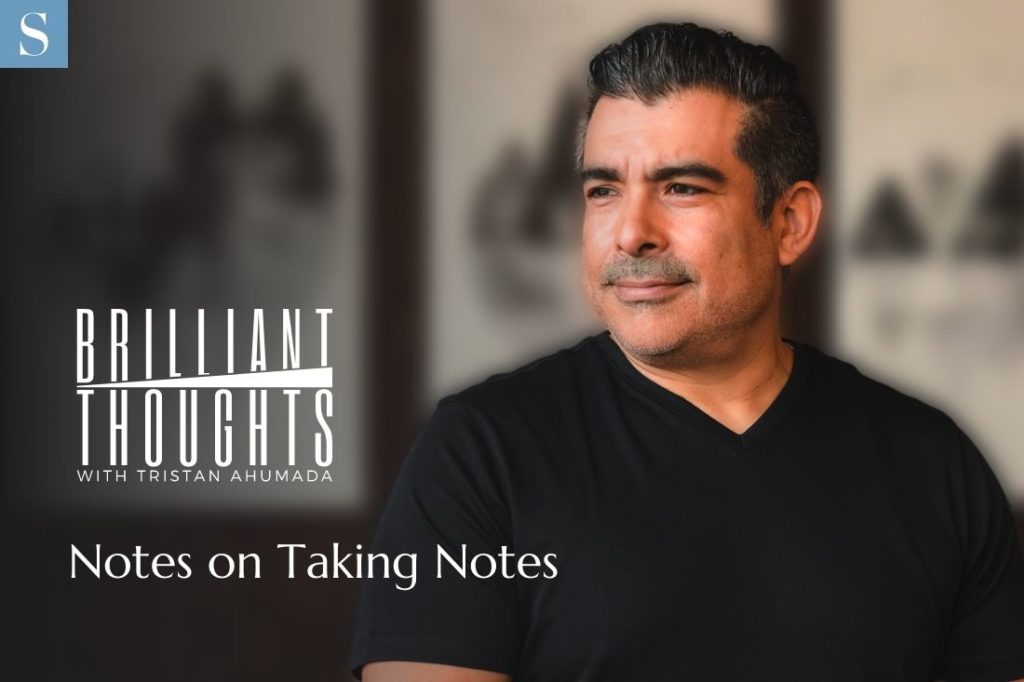If you’re like most people, you consume a near-endless stream of information and media every day. But how much of it actually sticks in your memory?
Probably not much, according to experts. In fact, research suggests that we forget as much as 90% of learned information within a week without reinforcement. For people who put a high price on their time and ability to communicate, that number is less than ideal. Luckily, there’s a shockingly simple way to improve cognition: active note-taking.
In this special solo episode, Brilliant Thoughts host Tristan Ahumada explains how taking notes according to your learning style can improve memory, focus and even communication. As with most personal growth journeys, it starts with understanding your own mind.
Put pen to paper.
In the digital age, putting pen to paper isn’t necessary; we have technology to transcribe and record information in almost every format. If you really want to remember something, though, you might consider analogue.
“Research has shown that writing things down triggers more brain activity, stronger neural encoding and more memory retrieval,” Ahumada says. Plus, taking notes manually gives the writer a physical copy to return to for review, an act that Hermann Ebbinghaus believed was essential to retention.
Ebbinghaus, a 19th-century German psychologist, revolutionized the field of memory by developing a concept known as “the forgetting curve.” His research illustrated the exponential decay of memory over time, as well as techniques to combat the loss. He found that the best way to remember lessons was to review them early and often.
To Ahumada, taking good notes is an essential precursor to being able to review (and then remember) lessons. However, that doesn’t mean it’s always easy. Note-taking can be challenging, especially when our minds start to wander and daydream. Discovering your learning style can help you find a technique that keeps you engaged.
Discover your learning style.
“The way you interpret information is the key to remembering it,” Ahumada says. Once you understand the ideal way for you to process information, you can adjust your note-taking practice accordingly to gain greater focus and retention. There are four main types of learners: auditory, kinesthetic, visual and read-write.
Auditory learners
Auditory learners retain the most information when they hear it aloud. Instead of trying to take detailed, word-for-word notes, auditory learners should listen intently and let their minds go wherever the story or lesson takes them. When an idea strikes them as important, they should jot it down in small, incomplete sentences to review later.
Ahumada is a partial auditory learner. When he listens, he’s always trying to learn or think of questions to ask—not about how to respond. When he does interviews, he writes down his questions as he’s listening to the interviewee, a practice that helps him dig deeper. Even though it may not feel natural at first, you can train your mind to transcribe as you listen.
Kinesthetic learners
These people need to move around when they’re learning. Think of that classmate who couldn’t stop bouncing their legs during a lecture or that coworker that’s always squeezing a stress ball in meetings—they needed physical movement in order to be mentally engaged.
For kinesthetic learners, the trick to taking notes is distracting the part of the brain that is restless. Typing thorough notes on a laptop is a great option because it occupies both hands, and when the hands are busy, the brain can focus on learning.
Visual learners
Visual learners are similar to auditory learners in that they need to see the big picture in order to remember it. Instead of taking detailed notes, though, they should write important words, phrases or big ideas in a memorable way. This could mean circling or coloring certain words, doodling or creating visuals that will signal meaning.
Read-write learners
As the name suggests, these learners are able to absorb a lot of information by reading and writing what they learn, typically in complete sentences. As a partial read-write learner, Ahumada knows the benefits of using headlines and fully formed sentences to process what he’s reading in real time.
Challenge yourself to practice.
As a history major in undergrad, Ahumada remembers writing lengthy papers. Upon entering law school, he quickly realized he’d need to be much more concise in summarizing briefs. In order to pivot his skills toward a new challenge, he practiced reading, taking notes and recapping—skills that are invaluable to his interview process today.
No matter which type of learner you are, developing an effective note-taking practice takes time and effort. To really improve your memory, you have to return to notes after you’ve written them: later that day, the next day, the day after that and so on. Ultimately, you won’t improve your mental acuity without commitment; however, being in a good headspace goes a long way.
“How you feel actually affects your memory,” Ahumada says. Before going into an interview, he takes some time to get into a positive headspace. He says that people can feel whether you’re listening and engaged, so out of respect, you take notes. Then for yourself, you review those notes to get better at retaining information.
Brilliant Thoughts with Tristan Ahumada is no longer releasing new episodes on the SUCCESS Podcast Network, but you can still listen to the full conversation below.







